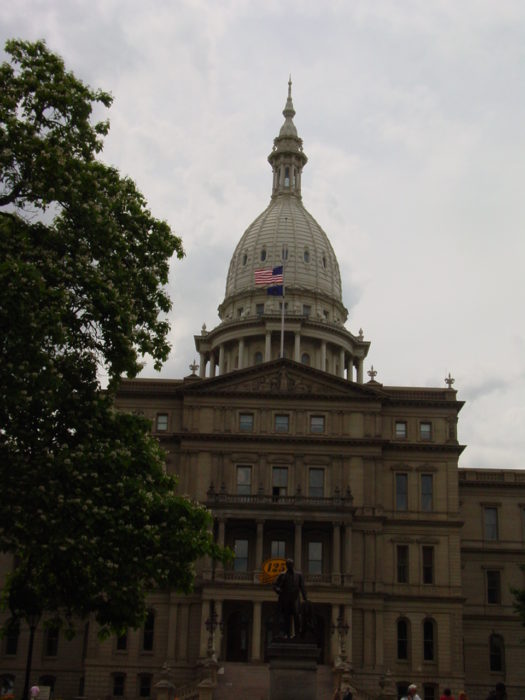
Courtesy of MIRS News Service
You wouldn’t know it by the protesters chanting outside the House Appropriations Committee room, but the Fiscal Year (FY) 2017 budget Gov. Rick SNYDER presented this morning to lawmakers inside the room may be his easiest sell, yet.
Republicans and Democrats struggled to find fault in spending $195 million on the Flint water crisis, $720 million over 10 years on the indebted Detroit Public Schools (DPS), $150 million more on K-12 education and more than $100 million each into infrastructure projects statewide and life-saving drugs for poor hepatitis C and Cystic Fibrosis patients.
“It looks like a Democratic budget,” mumbled one Democratic lawmaker after Snyder and Budget Director John ROBERTS, presented the spending plan.
Snyder’s sixth proposed budget would look like the type of budget he presented last year — where Democrats seemed to like Snyder’s spending priorities more than Republicans — but the GOP has reason to be excited this go around.
For one, the $54.89 billion proposal is only .8 percent higher than this year’s Fiscal Year (FY) 2016 and the $10.03 billion General Fund request is 1.5 percent above what he asked for last year. Both percentages are below the rate of inflation.
With the state’s gas tax and driver registration fee hike coming on line next Jan. 1, more than $400 million in General Fund money was freed up. It meant the emergency money for Flint without cuts elsewhere. It meant the $72 million in programs the tobacco money had been funding could be covered with freed-up General Fund money without a sweat.
House Speaker Kevin COTTER (R-Mt. Pleasant) said he would have liked to see a couple hundred million more for road maintenance work or some tax relief, but both took a back seat (“and rightfully so”) to the situation in Flint.
Asked what he thought the most controversial part of the FY ’17 budget would be, House Appropriations Committee Chair Al PSCHOLKA (R-Stevensville) paused a moment before he answered with an issue that’s not even in the budget.
“It’s the policy piece and the governance piece of DPS,” he said (See “Possible Education Commission Biggest Obstacle For DPS Package,” 2/4/16).
Lawmakers recoiled last year when Snyder suggested using the School Aid Fund to address DPS’s $515 million debt. The $50 million Snyder wanted set aside for DPS debt last year was so controversial, lawmakers hid the “non-appropriated” money within the School Aid Fund (SAF).
But once Snyder and Treasurer Nick KHOURI hammered home the point that DPS owes its money to the state and bankruptcy would mean a federal judge dictating how the state must repay itself, Republican lawmakers slowly came around.
“Members realize there is an obligation there in that inaction could be far more expensive than action,” Cotter said.
With the Governor now suggesting the $72 million a year going to DPS for 10 years comes from the state’s $100 million tobacco settlement allocation as opposed to a SAF, Republicans are much more likely to support it.
“It will fly a lot better than School Aid (money),” said Sen. Goeff HANSEN (R-Hart), the chair of the Senate K-12 Appropriations Subcommittee.
The critical Democratic comments were focused more on how to improve educational outcomes in a new Detroit Community Schools.
“What does education reform in the city of Detroit look like?” said Rep. Harvey SANTANA (D-Detroit). “How do we give kids the same type of opportunity? To succeed, to grow, to become the professionals in our society that we want them to be?”
Rep. Brian BANKS (D-Harper Woods), the chair of the Detroit caucus, wasn’t agitated by the numbers so much as what drove Snyder to present the numbers he did. After years of disinvesting in public schools and the city’s urban cores, Snyder is essentially having a deathbed conversion now that Flint’s municipal water supply and Detroit’s public schools have turned into crisis situations.
“It’s because of the past cuts combined with the temperature here in Michigan,” he said.
Along the same vein, Michigan Democratic Party Chair Brandon DILLON didn’t criticize the dollar amount the Governor laid out. He was agitated that the administration’s carelessness created the situation in the first place.
Dillon and other Democrats also want to see Rainy Day Fund money withdrawn to pay for lead pipe replacements across Flint. Flint Mayor Karen WEAVER wants to pull 15,000 pipes out of the ground this year, but needs state and federal money to do it.
“The Governor said that his budget treats the State like a family, but almost a year after his administration was warned of lead and Legionnaires’ Disease in Flint’s drinking water, his proposal contains no serious investments to replace the very pipes causing devastating illness and irreparable damage to the lives of children in Flint,” Dillon said.
Weaver didn’t exactly get that with this budget, although $50 million of the $195 million Snyder is proposing is being set aside for “future needs in Flint,” so it could arguably go to lead pipe replacement at some point.
“It’s challenging,” said Rep. Rob VERHEULEN (R-Walker). “There are a lot of unknowns from the medical and science standpoint and we want to make sure that we’re meeting the immediate needs while developing a long-term plan.
“I have no question we’ll be dealing with this in the out years so we need to do it methodically and make sure we’re not delaying in a way that causes more harm to people. That’s the challenge.”